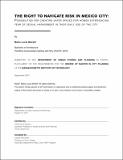THE RIGHT TO NAVIGATE RISK IN MEXICO CITY: Possibilities for creating safer spaces for women experiencing fear of sexual harassment in their daily use of the city
Author(s)
Morelli, Maria Lucia
DownloadThesis PDF (13.82Mb)
Advisor
D´Ignazio, Catherine
Terms of use
Metadata
Show full item recordAbstract
This thesis explores the effects of fear of harassment on women’s mobility choices in Mexico City by analyzing it through a Right to the City framework. Women’s fear of harassment constitutes a constant state of alert to the smaller and more subtle forms which exist in a spatial continuity as a woman travels throughout the city. It is the gestures, the catcalls, the pursuing, and the groping of women in public space which make women feel vulnerable and uncomfortable. The recurrence of these experiences is a constant reminder of the risk that is out there while moving in the city. This thesis explains how women negotiate with this risk either by constraining or modifying their mobility or by directly defying it –regardless of the negotiation method, fear plays a crucial role in their choices. To make such choices, women create mental risk maps of the spatiality of fear, where they overlay the social and physical conditions that elicit opportunity or probability of harassment.
I position my research with the goal of granting women with the Right to Navigate Risk. This concept, coined by urban theorist Carolyn Whitzman, criticizes the negative outcomes that can result from reducing the Right to the City to a Right to Safety or a Right to Mobility; examples include segregationist programs like women-only transport systems, and forced mobility evident in long, complex and unwanted trips. Analyzing results from an online survey designed to capture women’s everyday activities, their experiences of harassment and their travel choices, this thesis presents the extent to which fear of harassment hinders women’s Right to the City. I examine the strategies women employ to negotiate with risk, and then propose analytical axes needed to understand the dynamism of women’s experiences through the city in order to think about creating safer spaces so they can navigate risk.
Date issued
2021-09Department
Massachusetts Institute of Technology. Department of Urban Studies and PlanningPublisher
Massachusetts Institute of Technology